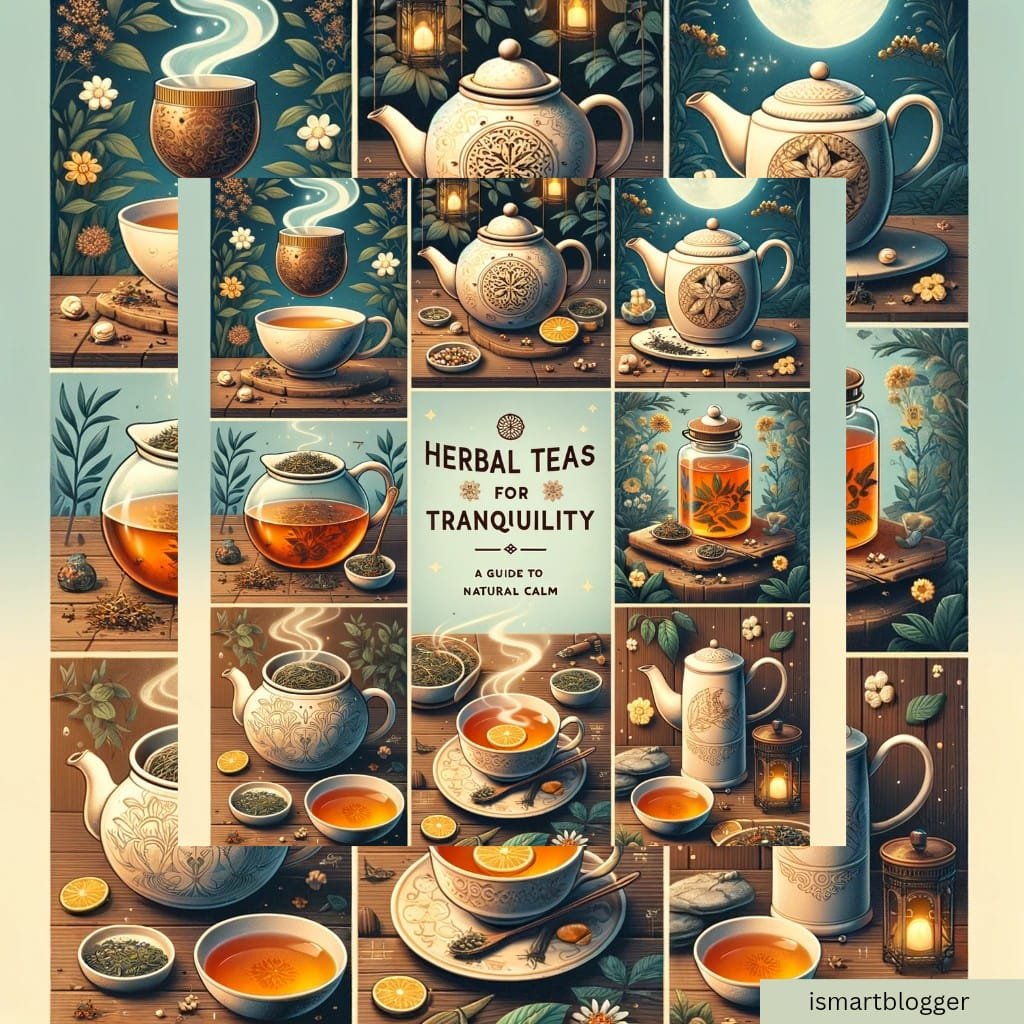Naturally Calm: A Guide to Herbal Teas for Tranquility
Discover the power of herbal teas for tranquility. Uncover the calming effects and therapeutic benefits of chamomile, lavender, and lemon balm.
Herbal Teas for Tranquility: A Guide to Natural Calm
Introduction
Tranquility and calm are essential aspects of a balanced and fulfilling life. In the midst of our fast-paced, modern world, finding moments of serenity can be challenging.
However, nature has provided us with a remarkable solution: herbal teas. These comforting brews not only offer a delightful sensory experience but also possess remarkable properties that promote relaxation and tranquility.

Definition of Herbal Teas
Before delving into the benefits of herbal teas for tranquility, it’s crucial to understand what exactly they are. Herbal teas, often referred to as tisanes or infusions, are beverages made from dried herbs, flowers, fruits, or other plant materials. Unlike true teas derived from the Camellia sinensis plant (such as green tea or black tea), herbal teas are entirely caffeine-free.
The vast variety of herbs used in creating these soothing concoctions allows for an extensive range of flavors and fragrances to suit every palate. From delicate floral notes to invigorating citrusy tones and earthy herbal blends – each cup brings its unique essence to be savored.
Importance of Tranquility and Calm in Our Daily Lives
In today’s bustling society filled with constant demands on our time and attention, finding moments of tranquility is more crucial than ever before. The need for relaxation extends beyond mere physical rest; it encompasses mental rejuvenation and emotional well-being as well.
Studies have shown that prolonged periods spent in states of stress can lead to various health issues such as anxiety disorders, insomnia, weakened immune system function, cardiovascular problems, and even depression. It is evident that tranquility is not just a luxurious indulgence but an essential component for maintaining overall wellness.
Overview of the Benefits of Herbal Teas for Promoting Relaxation and Tranquility
Herbal teas offer a natural and gentle way to promote relaxation and tranquility, without the side effects that can accompany pharmaceutical interventions. These teas are known for their ability to soothe the mind, calm the nerves, and provide an overall sense of well-being. One of the primary benefits of herbal teas lies in their capacity to stimulate the production of gamma-aminobutyric acid (GABA) in our brain.
GABA is a neurotransmitter that helps regulate neuronal excitability. By increasing GABA levels, herbal teas effectively reduce anxiety and induce a state of relaxation.
Furthermore, many herbal teas contain compounds with sedative properties that can aid in improving sleep quality. For individuals struggling with insomnia or restless nights, sipping on a cup of chamomile tea or lavender tea before bedtime can promote peaceful slumber.
Additionally, herbal teas have been found to possess anti-inflammatory properties that can help alleviate physical discomfort and tension in the body. By targeting inflammation at its source, these teas contribute to an overall sense of calmness and well-being.
Understanding Herbal Teas
What are herbal teas?
Herbal teas, also known as tisanes, are beverages made by infusing various plant materials such as leaves, flowers, seeds, or roots in hot water. Unlike true teas derived from the Camellia sinensis plant (green tea, black tea, white tea), herbal teas do not contain any actual tea leaves.
Instead, they offer a delightful array of flavors and aromas infused by the herbs themselves. The diversity of herbal teas is vast and includes popular options like chamomile, lavender, peppermint, and ginger.
Definition and characteristics
Herbal teas are characterized by their unique compositions that contribute to their distinct flavors and therapeutic properties. Often referred to as “herbals,” these infusions harness the power of nature’s bounty to provide a multitude of health benefits. The primary defining characteristic of herbal teas is that they consist solely of herbs or botanical ingredients.
They can be consumed hot or cold and are typically caffeine-free. Each herb imparts its own specific taste profile onto the brew—ranging from sweet to earthy or minty—and may offer various potential health advantages.
Differentiating herbal teas from true teas (green, black, white, etc.)
While all true teas derive from the same plant species (Camellia sinensis), herbal teas encompass an entirely different category of beverage due to their ingredient composition. True teas undergo processes such as oxidation and fermentation during production that ultimately determine their type—green tea being unoxidized while black tea is fully oxidized. In contrast, herbal teas rely on plants other than Camellia sinensis for their infusion base.
History and cultural significance of herbal teas for tranquility
The use of herbs for promoting relaxation dates back centuries across multiple civilizations. Ancient cultures recognized the calming properties of certain plants and incorporated them into their daily lives.
For instance, in ancient Egypt, chamomile was highly regarded for its soothing effects, often used to alleviate anxiety and promote quality sleep. Traditional Chinese medicine also embraced the power of herbal teas like honeysuckle or chrysanthemum to balance the body and mind, fostering tranquility.
Similarly, Ayurveda, the traditional Indian system of medicine, has a rich history of utilizing herbs in various forms including teas to restore equilibrium within the body and enhance serenity. The cultural significance of herbal teas as a means to achieve tranquility transcends borders, with diverse practices found worldwide.
From Japanese matcha tea ceremonies emphasizing mindfulness to Moroccan mint tea serving as a symbol of hospitality and relaxation, different cultures have integrated herbal teas into their rituals and traditions for millennia. By understanding what herbal teas are, differentiating them from true teas like green or black tea, and appreciating their historical significance across cultures for promoting tranquility, we can delve deeper into the fascinating world of natural calm offered by these botanical brews.
The Science Behind Herbal Teas’ Calming Effects
Active compounds in herbs that promote tranquility
Herbal teas have long been praised for their ability to induce a sense of tranquility and calmness. This remarkable effect can be attributed to the presence of various active compounds within these plants.
One such compound found in chamomile is apigenin, a flavonoid known for its anxiolytic properties. Apigenin interacts with receptors in the brain, particularly GABA receptors, which are responsible for inhibitory neurotransmission.
This interaction helps to reduce anxiety and promote relaxation. Lavender tea contains linalool, a terpene with sedative effects that contributes to its calming properties.
Linalool binds to GABA receptors as well, further enhancing inhibitory neurotransmission and exerting an anxiolytic effect on the brain. Additionally, linalool has been found to modulate other neurotransmitters like serotonin and dopamine, which play crucial roles in regulating mood and emotions.
Another herb known for its tranquilizing effects is lemon balm. Lemon balm tea contains rosmarinic acid, a phenolic compound that exhibits both anxiolytic and antioxidant properties.
Rosmarinic acid stimulates GABA receptors, promoting the release of this inhibitory neurotransmitter within the brain. By increasing GABA levels, lemon balm helps reduce anxiety and promotes relaxation.
How these compounds interact with our body and brain to induce calmness
The active compounds present in herbal teas interact with our body’s systems in fascinating ways that lead to a state of calmness. When consumed, these compounds are absorbed into the bloodstream through the digestive system and then cross the blood-brain barrier to reach their target sites in the brain. By binding to GABA receptors, such as chamomile’s apigenin or lavender’s linalool, the compounds enhance the effects of GABA, which is an inhibitory neurotransmitter.
GABA acts as a natural tranquilizer by reducing the activity of excitatory neurotransmitters, such as glutamate. This inhibitory action results in a calming effect on the brain and helps to alleviate anxiety and promote relaxation.
In addition to modulating GABA receptors, these active compounds also influence stress hormones. For instance, chamomile’s apigenin has been found to reduce levels of cortisol, a hormone released in response to stress.
By regulating cortisol levels, herbal teas can help mitigate the physiological effects of stress on our bodies and contribute to an overall sense of calmness. By understanding how these compounds interact with our body and brain, we gain insight into the scientific basis behind herbal teas’ calming effects.
These natural remedies provide a gentler alternative to pharmacological interventions and offer a holistic approach to promoting tranquility and well-being. Remember that before incorporating herbal teas into your routine for therapeutic purposes or if you have any existing medical conditions or are taking medications, it’s essential to consult with a healthcare professional for personalized advice.
Popular Herbal Teas for Tranquility
Chamomile Tea
Chamomile tea, derived from the daisy-like flowers of the chamomile plant, has a long history as a calming herb. This delicate and aromatic tea has been used for centuries in traditional medicine to promote relaxation and soothe the mind. Originating from the Mediterranean region, it was highly regarded by ancient Egyptians, Romans, and Greeks for its therapeutic properties.
Beyond its ability to induce calmness, chamomile tea offers numerous health benefits. One notable benefit is its anti-inflammatory properties.
Chamomile contains flavonoids such as apigenin that work as antioxidants in the body, reducing inflammation and potentially aiding in conditions like arthritis or digestive issues. Additionally, chamomile tea is known for its soothing effects on the stomach and can help alleviate symptoms of indigestion or menstrual cramps.
Lavender Tea
Lavender tea is celebrated not only for its delightful aroma but also for its distinctive features that contribute to tranquility. Made from the dried flowers of the lavender plant, this herbal infusion has been used for centuries to relax both body and mind. Lavender’s calming effects are attributed to compounds like linalool present in its flowers.
Apart from promoting calmness, lavender tea offers various therapeutic uses that make it truly remarkable. One such use is aiding sleep.
The soothing aroma of lavender helps create a serene environment conducive to a restful night’s sleep by reducing anxiety levels and promoting relaxation. Additionally, lavender tea may have benefits beyond tranquility; it possesses antiseptic properties that can aid in wound healing or skin irritations.
Lemon Balm Tea
Lemon balm tea might be lesser-known compared to other herbal teas; however, it possesses powerful calming effects that should not be overlooked. This refreshing and zesty tea is derived from the leaves of the lemon balm plant, which has been used since ancient times to soothe nerves and promote a sense of tranquility.
Lemon balm tea is unique due to its distinctive properties. It contains compounds like rosmarinic acid that interact with receptors in the brain responsible for reducing anxiety and inducing relaxation.
Additionally, this herbal tea may have potential cognitive benefits, such as improving memory and focus. However, it’s important to note that lemon balm can have mild sedative effects, so it should be consumed with caution, especially when operating machinery or driving.
Conclusion
In a world filled with constant stimulation and stress, finding moments of tranquility becomes increasingly important for our overall well-being. Herbal teas such as chamomile, lavender, and lemon balm provide natural avenues towards achieving calmness and relaxation. Beyond their ability to soothe the mind, these teas offer additional health benefits ranging from anti-inflammatory properties (chamomile) to aiding sleep (lavender) or improving cognitive function (lemon balm).
By incorporating these herbal teas into our daily routines, we can create space for self-care and find solace in the simple act of sipping a warm cup of tea. Embracing these natural remedies allows us to reconnect with nature’s gifts and prioritize moments of tranquility amidst life’s hustle and bustle. So why not brew yourself a cup of herbal tea today? Take a moment for yourself – you deserve it!





